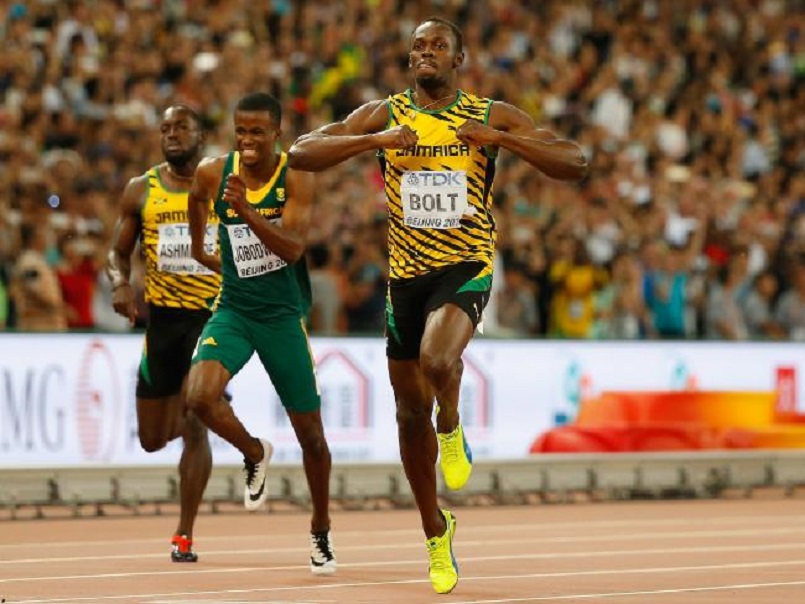
USAIN Bolt has some explaining to do.
The world’s fastest man may have six Olympic gold medals, but that doesn’t mean he’s perfect.
Far from it, in fact, if you consider his agent Ricky Simms’ most recent shock admission about the Jamaican track star.
For all his celebrity and speed, Bolt has never run a mile.
He’s never run the 1609m middle distance mark. Ever.
Sure, the 29-year-old, has never needed to run further than 200m to cement his reputation as one of the greatest athletes ever seen, but one would assume a professional athlete would have, at some point, shuffled the 400m Olympic track four times consecutively.
Wrong.
“Usain has never run a mile,” Simms told The New Yorker.
The magazine attempts to answer the question of how quick Bolt could run the magic mile in a piece by Charles Bethea.
The mechanics of running the 100m do not necessarily transfer to the physical attributes needed to run 1600m.
In fact, as you may expect, exercise physiologist experts believe Bolt would get nowhere near the mark of the fastest mile ever run.
Moroccan legend Hicham El Guerrouj ran his magic mile in 1999 with a time of 3:43.13.
Some human movement experts believe Bolt would even struggle to record a 1600m distance under five minutes.
There is an explanation.
“Speed over short distances does not automatically guarantee relative speed over long distances,” exercise physiology professor at University of the Free State professor Ross Tucker told The New Yorker.
“Mainly because the system used to produce energy sent to muscles is quite different. What a 100m or 200m sprinter relies on is incapable of meeting his demands over a mile. By definition, the training a short-distance sprinter does is in polar opposition to that of a middle-distance runner. One-hundred-metre speed translates pretty well up to 400m. But after that there is a large change.”
Former cross-country coach at university level Robert Johnson said Bolt’s speed would not aid him over a mile.
“He’s a total fast-twitch-muscle-fibre guy,” Johnson, the co-founder of letsrun.com, said.
“To expect Bolt to be good at the mile simply because he is the world’s greatest sprinter would be like expecting a great 320 pound (145kg) NFL offensive lineman to be good at playing running back simply because he’s a great football player. It’s ludicrous.”
Fortunately, for the athletics superstar, 1600m is a distance he doesn’t need to be concerned about.
Taking care of business in the 100m and 200m is the only thing he needs to do to become one of the greatest athletes of all time.
Since he coasted to the 100m finish line in world-record time at the Bird’s Nest eight years ago, Usain Bolt has been the smiling face of track and field. He has served as the anchorman of the Olympics — virtually the only reason any casual fan would pay attention to a sport that has orchestrated its own slow, sad, drug-infused downfall.
His tender hamstring improving, Bolt will be back for a final crack at Olympic glory when track starts in Rio de Janeiro on August 12.
If, as expected, he wins all three sprint events — the 100, 200 and 4x100 relay — he’ll only add to his legacy and cement himself at the fore of any conversation about Greatest Olympian Ever. He is already the first person to win back-to-back Olympic gold at 100 and 200 metres.
Whether viewed over the six days he runs in Rio, or over the eight years he’s graced the world with his once-in-a-lifetime mix of speed, smiles and showmanship, the World’s Fastest Man has offered track a reprieve from the wasteland of corrupt countries, reshuffled medals and win-at-any-cost malfeasance it has become.
That’s not so much Bolt’s concern.
Over the past four years, only one man, American Justin Gatlin — the 2004 100-metre gold medallist who, himself, has served two doping bans — has been able to seriously challenge Bolt at either 100 or 200 metres. More than racing against Gatlin, though, Bolt is racing against the clock — and into history.
And yet, the doping scourge doesn’t elude him, either. His relay medal from 2008 is in jeopardy now, thanks to retests conducted by the IOC that indicate teammate Nesta Carter could have used a banned substance.
In the past, the IOC has stripped entire relay teams of medals even when only one person dopes.
At almost every stop he makes, Bolt is asked about doping.
In an interview before his tune-up race in London in July, he showed off the Band-Aid covering the mark where testers had drawn their latest tube full of blood.
“Rules are rules and doping violations in track and field is getting really bad, so if you feel like you need to make a statement then thumbs up,” Bolt said of the Russian ban.
He has never tested positive, has mostly managed to smile through the thinly veiled questions about his own doping virtue, and, when the stakes are greatest, has rarely failed to put on a show people want to watch.
The next act starts with 100-metre qualifying on Aug. 13. Bolt, who turns 30 on the day of the closing ceremony in Rio, has said he’ll hang up the spikes after an encore season in 2017, but more recently has left the door slightly cracked for racing beyond that.
